Canada Burns
When you can see climate change out your window and taste it in your throat, the crisis gets that much more visceral. There’s just one way to end this, and it begins with oil and gas emission caps.
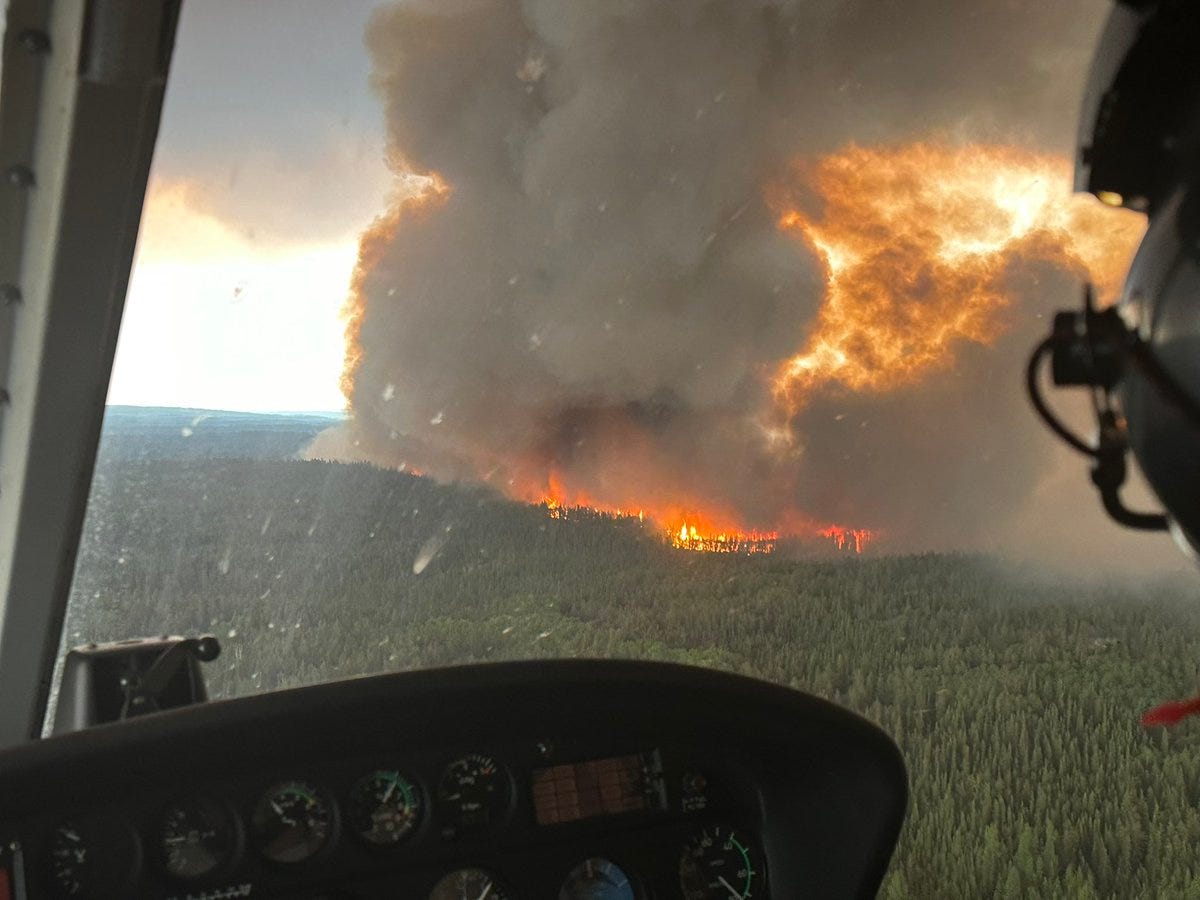
After nearly a decade of telling the climate and energy story, of recounting the pain and peril facing countless communities on the front lines of a global emergency, the crisis literally came home to us this week.
The Energy Mix is produced by a distributed team spanning four countries, but our home office is in Ottawa, Canada, where dozens of out-of-control wildfires in Quebec have produced hazy skies, dangerously bad air, and deep anxiety, with no immediate end in sight. There was a moment last week when we had the worst air quality in the world, and concentrations of hazardous PM 2.5 particulate matter briefly peaked at 511 parts per million at about 4 AM Wednesday.
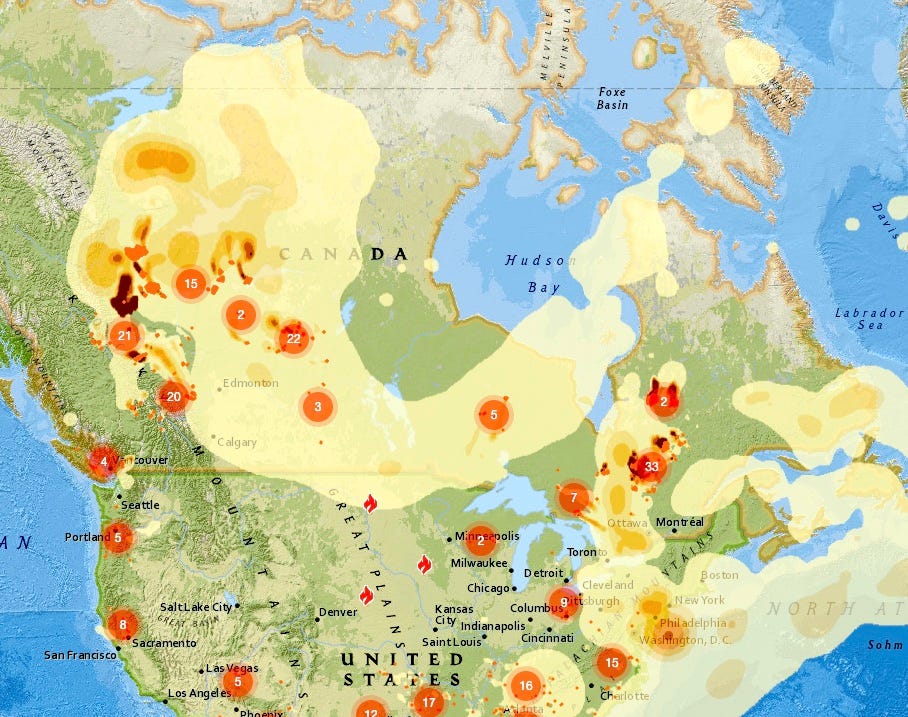
Small comfort, but as we donned our N95 masks and learned the fine points of air purifiers, we knew there was nothing unique going on here. The Mix has routinely, necessarily written about the wave of past wildfires sweeping the world, some but by no means all of them in Canada.
But as all those other communities that came before us can attest, the climate crisis is still a whole lot more visceral when you can see it out your window and taste it in your throat.
Here are some of the stories we’ve followed over the years.
Australia ‘Megafires’ Hit Wildlife Harder than Regular Blazes
Wildfires, Heat Emergencies Sweep North America, Europe, Middle East, and Eurasia
Hundreds Dead From Heat as Extreme Temperatures Scorch North Africa, Asia, Europe, China
Chile Receives International Aid as Wildfires Kill 11, Burn 400,000 Hectares
Arctic Wildfires Show Approach of New Climate Feedback Loop
Hundreds of Thousands Face Blackouts, Wildfires, Evacuations as California Heat Wave Continues
Early Wildfires, Heat Waves Show Grim Signs of Global Climate Crisis
Out-of-Control Wildfire Burns Homes, Forces Evacuations Outside Halifax
Lytton-Area Tribal Council Criticizes B.C.’s ‘Slow, Chaotic’ Wildfire Response
One-Third of Fort McMurray High Schoolers Show Signs of PTSD
‘Crushing Moments’ of Wildfire, Drought Must Spur Governments to Action, Newton Says
As 350.org co-founder Bill McKibben pointed out a couple of days ago, “today in the American east is what most days feel like in Asia. We no longer need to burn stuff, so we should stop.”
Fires Raging Everywhere
But meanwhile, “every province in Canada—the entirety of the second-largest country in the world—has a fire raging,” wrote veteran climate hawk Catherine Abreu, founder and executive director of Destination Zero. “This has never happened before as far as we know. Canada has surpassed 4.3 million hectares burned this year. Last year only 28,000 hectares had burned by June 7. That’s an increase of about 14,400%.”
[Disclosure: I serve on the board of Destination Zero, currently as chair.]
It hasn’t helped to see a publication like the New York Post take its usual high road, greeting this rolling, rising calamity with fun headlines like “Eh!Pocalpyse Now” and “Blame Canada!”
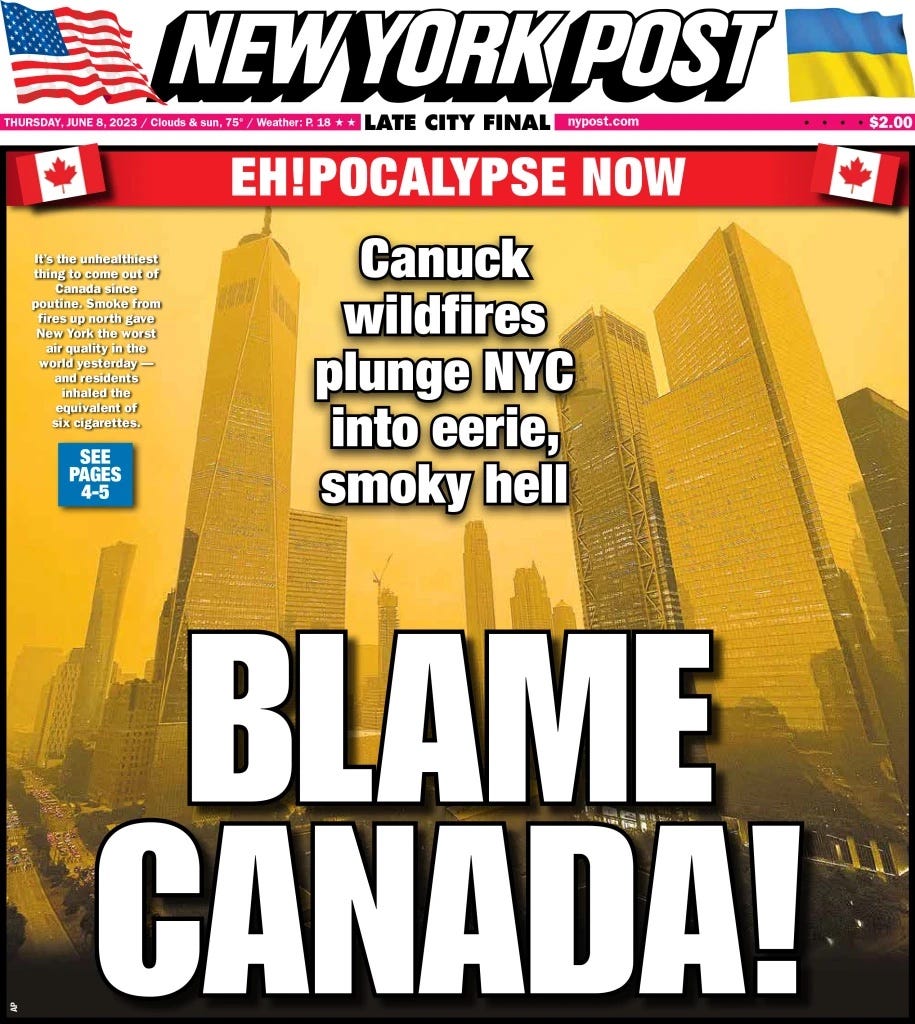
“Thousands of people are being harmed, evacuated, and having their homes and communities destroyed. Hundreds of thousands of animals, insects, and trees are being displaced and killed,” Abreu said in an email.
“Yet my inbox and social media channels are full of stories and calls to action about smoke in the U.S. When references are made to Canada, it’s a throwaway about the origin of this smoke, or a joke about ‘blaming’ Canada.”
“As we would with other disasters caused by climate change and the huge and growing emissions from fossil fuels, please let us extend our kindness and solidarity to those suffering the enormous impacts and loss of this emergency….Canada is a place full of life that’s under threat, not an empty space close to the U.S. that’s inconveniently on fire.”
As of Thursday, more than 400 wildfires were burning across Canada, more than one-third of them in Quebec and many of them out of control. The country had already seen 2,145 fires, including 46 new ones in the previous 24 hours, the Canadian Interagency Forest Fire Centre (CIFFC) reported. That’s a big jump over the previous 10-year average of 1,624 fires for the same time of year.
The 13 priority fires on the CIFFC’s daily update included five in Ontario, four in Quebec, three in British Columbia, and one in the Northwest Territories. The top three all came in above 100,000 hectares, (1,000 square kilometres) each, with a fourth clocking in at more than 75,000:
• The Donnie Creek fire in the heart of natural gas fracking country outside Fort St. John, B.C., at 310,805 hectares;
• The Sambaa K'e fire in the Northwest Territories, at nearly 250,000 hectares;
• Two wildfires in Eeyou Istchee (Cree Nation Government) territory in Northern Quebec, forcing evacuations from the Waswanipi and Ouje-Bougoumou communities, totalling about 210,000 hectares between them.
We Know What We Have to Do
It’s sad, scary, dangerous, infuriating. It’s happening around us in real time. And we know what to do about it.
It’s too soon for the attribution science that will tell us how closely this wave of fires connects to climate change. But that science is precise enough to conclude that 88 fossil fuel and cement companies share responsibility for 37% of the wildfire losses between 1986 and 2021 in the western regions of Canada and the United States. The Energy Mix was the first, possibly the only news outlet to name the 13 fossil fuel companies either based or operating in Canada that made the list.
Curtailing carbon today won’t bring results this summer or next—although some scientists believe fast, deep emission cuts could stabilize global temperatures in as little as three to four years. But if it takes longer to stop wildfires from turning the average summer into an annual hellscape, that’s all the more reason to do it all, do it now, and do it to the max to drive down the climate pollution at the heart of the crisis, beginning with fossil fuel emissions.
The Next Opportunity Begins Now
The next, essential opportunity to get at those emissions is unfolding as we speak. Environment and Climate Change Minister Steven Guilbeault has promised a federal cap on oil and gas emissions by the end of this year. The sector accounts for 28% of the country’s greenhouse gas emissions, and companies have made it crystal clear they won’t get this done voluntarily.
The emissions cap has run into sustained opposition and stepped-up lobbying from the Pathways Alliance, the industry group whose six members account for 95% of Canada’s oil sands production. The good news is that Guilbeault and Prime Minister Justin Trudeau are both pushing back on some of the results of that high-stakes politicking. When CTV host Vassy Kapelos asked Guilbeault a couple of days ago whether the wildfires would prompt Ottawa to move faster on its climate targets, he replied that the government could be more aggressive without political pushback.
"What would greatly help our capacity to accelerate our fight against climate change in Canada is if I didn't have to fight with certain jurisdictions all the time on doing the bare minimum to fight climate change, if I wouldn’t have to fight the Conservative Party of Canada," he said.
That was after opposition leader Pierre Poilievre vowed to block passage of a federal budget that pivoted heavily to cleantech investment incentives, trying (pretty ineffectually, in the end) to keep MPs in Ottawa all summer to rewrite the bill and throw a wrench into the government’s plans. During that debate, Conservative finance critic Jasraj Singh Hallan accused Finance Minister Chrystia Freeland of pouring a “$60-billion jerry can of fuel on the inflationary fire,” while real-life fires raged scarcely 150 kilometres away.
"I’ve witnessed the health impacts of wildfires,” Yellowknife, NWT emergency room physician Dr. Courtney Howard said this week. “As smoke fills the skies across Canada, school children are being kept indoors,” and today’s trends mean higher emissions than anyone can adapt to in a healthy way.
“That’s why all our adaptation strategies must be paired with policies to rapidly cut greenhouse gas emissions,” Howard added. “We need a cap on oil and gas emissions in order to protect all the children who are currently staying inside due to smoke that they did not have a hand in creating."
Mitchell Beer traces his background in renewable energy and energy efficiency back to 1977, in climate change to 1997. Now he and the rest of the Energy Mix team scan 1,200 news headlines a week to pull together The Energy Mix, The Energy Mix Weekender, and our newest weekly e-digest, Cities & Communities.
You can also bookmark our website for the latest news throughout the week.
Video of the Week
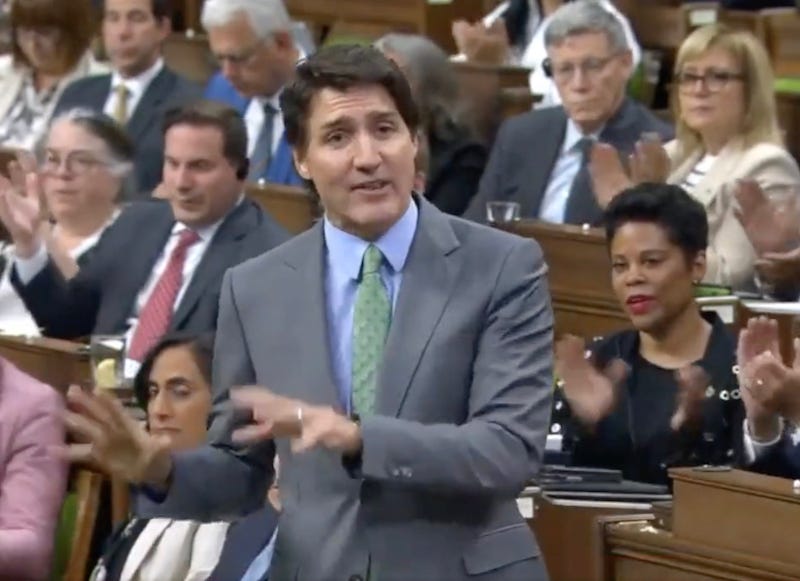
We’re devoting this extended ICYMI section to a selection of wildfire news from across Canada and beyond.
Reporters Get First Look at Heart of Tantallon, NS Fire Destruction (Halifax Examiner)
Donnie Creek Wildfire Is Now 2nd Largest Recorded in B.C.'s History (Canadian Broadcasting Corporation)
After Overnight Evacuation, Cree Nation of Waswanipi Finds Shelter, Solace in Quebec City (Canadian Broadcasting Corporation)
Oujé-Bougoumou Cree Nation Begins Evacuations as Forest Fire Approaches in Northern Quebec (Canadian Broadcasting Corporation)
Algonquins of Barriere Lake Members Evacuated from Territory as Quebec Wildfires Burn (Canadian Broadcasting Corporation)
Lack of Rainfall Presents Uncertain Outlook for Farmers in Alberta (Canadian Broadcasting Corporation)
Forest Fires Could Destabilize Quebec Wildlife for Years to Come, Say Experts (Canadian Broadcasting Corporation)
Parliament Fiddles While Canada Burns (Canadian Broadcasting Corporation)
Ford Refuses Calls to Link Wildfires to Climate Change (Canadian Broadcasting Corporation)
Canada’s Wildfires Are Part of Our New Climate Reality, Experts and Officials Say (The Guardian)
Canadian Wildfires Become the Global Face of Unfolding Ecological Disaster (Toronto Star)
With Wildfires and Droughts, the Global Water Emergency Is In Plain Sight (Corporate Knights)
Our Smoke, Their Sky: Canadian Haze Triggers Everything from Gags to Jabs as it Hits U.S. Capital (Canadian Broadcasting Corporation)
Arriving Flights at LaGuardia, Newark Airports Stopped Due to Smoke, Air Quality (The Messenger News)
More U.S. Firefighters on Standby as Wildfires Continue to Rage Across Canada (Globe and Mail)
The Impact of Stratospheric Aerosol Injection on Extreme Fire Weather Risk (AGU)
Demand Surges for Giant Heat Pumps as Europe Turns to District Heating
2.7M Hectares Lost, Nova Scotia at Ground Zero in ‘Unprecedented’ Early Wildfire Season
Cooling Upper Atmosphere Has Scientists ‘Very Worried’
Iron & Earth Lands $16M to Help Fossil Fuel Workers Enter Net-Zero Jobs
Is Equinor’s Bay du Nord ‘Delay’ a Cancellation in Slow Motion?
Hawaii Firm Turns Home Water Heaters into Grid Batteries
Renewables ‘Set to Soar’ with 440 GW of New Installations in 2023: IEA
Climate Finance Bill Sent to Senate Banking Committee for Review
‘Substantial Damage’, No Injuries as Freight Train Hits Wind Turbine Blade


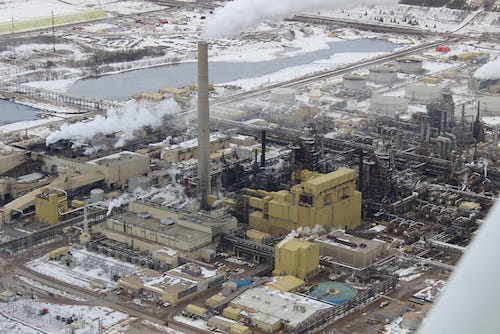



Thanks so much, Carolyn! Everything on this page is *always* available for sharing as you see fit.
ay I share this issue on social media?